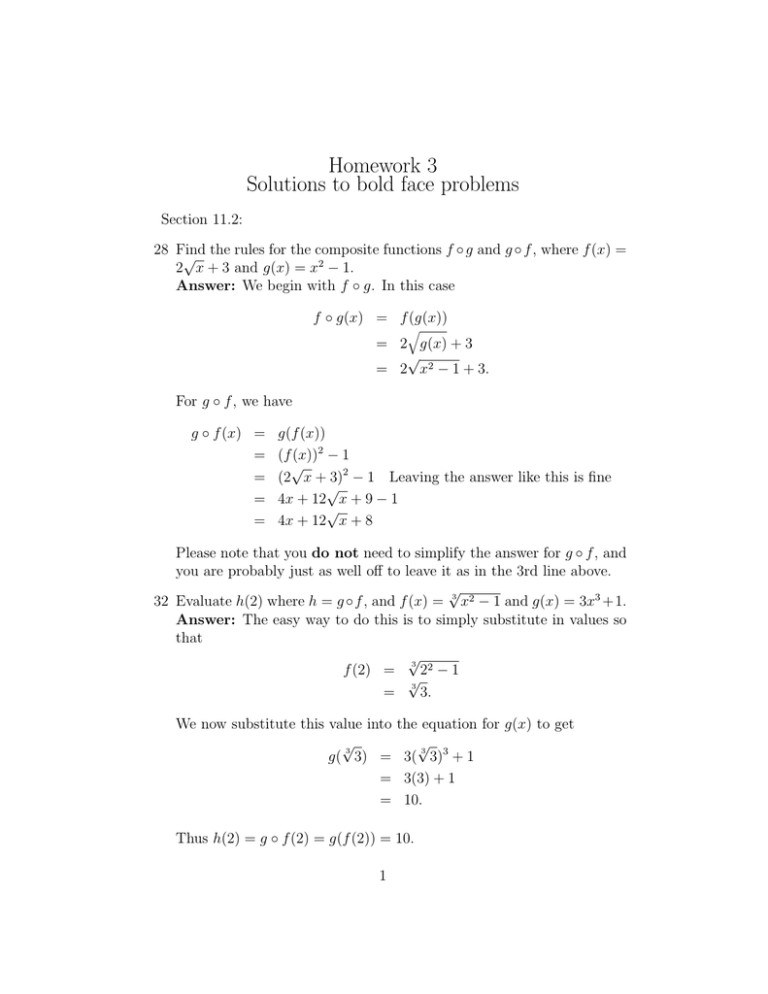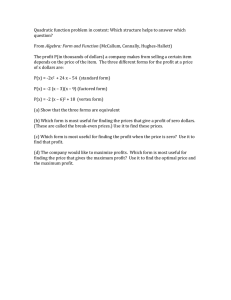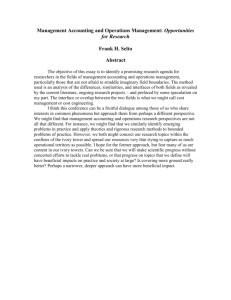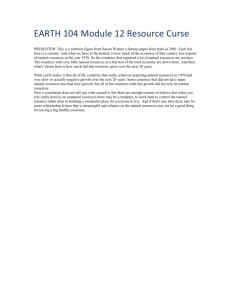Homework 3 Solutions to bold face problems
advertisement

Homework 3 Solutions to bold face problems Section 11.2: 28 Find functions f ◦ g and g ◦ f , where f (x) = √ the rules for the composite 2 2 x + 3 and g(x) = x − 1. Answer: We begin with f ◦ g. In this case f ◦ g(x) = f (g(x)) q = 2 g(x) + 3 √ = 2 x2 − 1 + 3. For g ◦ f , we have g ◦ f (x) = = = = = g(f (x)) (f (x))2 − 1 √ (2 x + 3)2 − 1 Leaving the answer like this is fine √ 4x + 12 x + 9 − 1 √ 4x + 12 x + 8 Please note that you do not need to simplify the answer for g ◦ f , and you are probably just as well off to leave it as in the 3rd line above. √ 32 Evaluate h(2) where h = g ◦f , and f (x) = 3 x2 − 1 and g(x) = 3x3 +1. Answer: The easy way to do this is to simply substitute in values so that √ 3 f (2) = 22 − 1 √ 3 = 3. We now substitute this value into √ 3 g( 3) = = = the equation for g(x) to get √ 3 3( 3)3 + 1 3(3) + 1 10. Thus h(2) = g ◦ f (2) = g(f (2)) = 10. 1 A second method is to use the equations for f (x) and g(x) to find the equation for h(x). This method looks as follows: h(x) = = = = = = g ◦ f (x) g(f (x)) 3(f (x))3 + 1 √ 3 3( x2 − 1)3 + 1 3(x2 − 1) + 1 3x2 − 2. Now we can substitute x = 2 into this equation to get h(2) = 3(22 ) − 2 = 10. 38 Find functions f and g such that h = g ◦ f where h(x) = (2x − 3)3/2 . Answer: The method to do this often involves looking inside the parentheses (or root sign), so in this case, we identify the “inner” function as f (x) = 2x − 3 and then h(x) = (f (x))3/2 . Then the “outer” function would be g(x) = x3/2 . Thus an answer could be f (x) = 2x − 3 and g(x) = x3/2 . 56 The total cost incurred by time t in a production of a certain commodity is f (t) dollars. The number of products produced by time t is g(t) units. What does the function f (t)/g(t) represent. Answer: Following the descriptors (dollars and units), f (t)/g(t) would have descriptor dollars/unit. Thus f (t)/g(t) denotes a type of cost/unit. In this case, f (t)/g(t) denotes the total cost incurred by time t divided by the number of units produced by time t. We would more commonly call this the average cost of producing a unit between time 0 and time t. Section 11.3 8 An efficiency study showed that the average worker at Delphi Electronics assembled cordless telephones at the rate of 3 f (t) = − t2 + 6t + 10 (0 ≤ t ≤ 4) 2 2 phones/hour, t hour after starting work during the morning shift. At what rate does the average worker assemble telephones 2 hours after starting work? Answer: This is given by the value of f (2), which is 3 f (2) = − 22 + 6 · 2 + 10 = −6 + 12 + 10 = 16 2 phones/hour. 26 According to the World Wildlife Fund, a group in the forefront of the fight against illegal ivory trade, the price of ivory (in dollars/kilo) compiled from a variety of legal and black market sources is approximated by the function ( f (t) = 8.37t + 7.44 if 0 ≤ t ≤ 8 2.84t + 51.68 if 8 < t ≤ 30 where t is measured in years, with t = 0 corresponding to the beginning of 1970. a Sketch the graph of the function f . 120 100 80 60 40 20 5 10 15 20 25 30 b What was the price of ivory at the beginning of 1970? At the beginning of 1990? Answer: In 1970, t = 0 and in 1990 t = 20. Thus in 1970, the price is given by f (0) = 8.37 · 0 + 7.44 = 7.44dollars/kilo, 3 and in 1990 the price is given by f (20) = 2.84(20) + 51.68 = 108.48dollars/kilo 4


